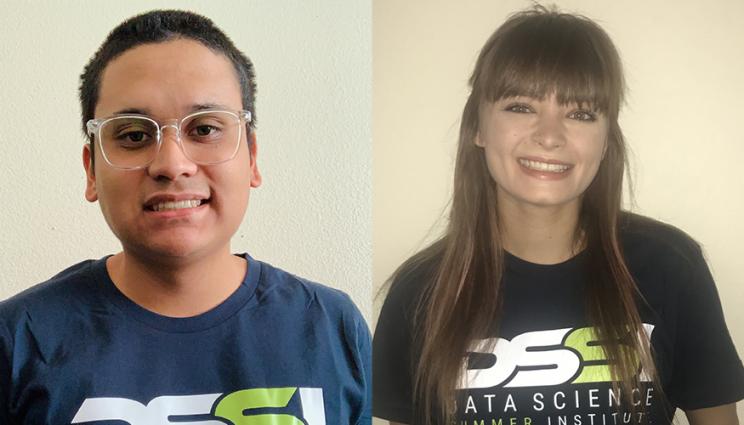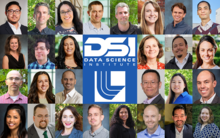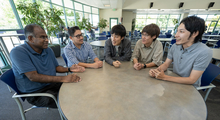Data Science Institute collaborates with Livermore Lab Foundation and UC Merced to host two year-long fellowships
Early this spring, the Livermore Lab Foundation (LLF) in partnership with the UC Merced, awarded two rising seniors, Jose Garcia-Esparza and Teagan Zuniga, two one-year $15,000 fellowships to participate in the Lab’s Data Science Summer Institute (DSSI) and continue a part-time fellowship at the Lab for the remainder of the 2020–21 school year.
The fellowships allow deserving students selected from a competitive field of applicants the opportunity to focus on their STEM studies, pursue an LLNL fellowship without financial worry, and have access to LLNL mentors throughout their senior year of college. “These fellowships are just one of several ways the Foundation is working to inspire and prepare the next generation of scientists and engineers to help solve society’s greatest challenges,” says Sally Allen, executive director of the LLF, a nonprofit that supports science education programs and transformational research initiatives at LLNL.
“Every summer, the Data Science Institute sponsors a summer internship program where data science graduate students and advanced undergraduate students get to apply next-generation science and engineering to counterterrorism and nonproliferation, defense and intelligence, and energy and environmental security—problems that really matter to our country,” states DSSI director Goran Konjevod.
“The DSSI provides the students with a unique opportunity to develop their data science skills by spending 50% of their time learning and applying those data skills to two data science challenge problems using real-world LLNL datasets. DSSI is a very competitive program and without the partnership with LLF, these students may not have had the opportunity to participate,” adds Marisol Gamboa, former DSSI co-director. The students spend the other 50% of their time during the DSSI working closely with a mentor on a project aimed to further data science research at the Lab.
“There is a tremendous need for researchers trained in data science, but from the outside it can be hard to know what any particular job would be like. The DSSI is a perfect way for students to see what data science work is really like,” says Suzanne Sindi, associate professor of Applied Math and the UC Merced lead on this collaboration.
Jose Garcia-Esparza, a computer science and engineering major from Clovis, California, heard about the DSSI program and LLF scholarship, but was reluctant to apply until one of his professors convinced him to “go for it.” During the twelve-week summer internship, Garcia-Esparza supported machine learning research for the Feedstock Optimization Project, which entailed developing and evaluating machine learning techniques for material properties predictions.
For the remainder of the school year, in addition to his studies, Garcia-Esparza has been working with his LLNL mentor, Brian Gallagher, group lead of the Data Science & Analytics Group in the Center for Applied Scientific Computing (CASC), on a web application project: “Natural Language Processing of Photo Quantum Literature,” which uses Python Flask for the framework, sqlite3 for the database management, and spaCy, an open-source software library, for advanced natural language processing.
“The application will allow chemists to input chemical compounds in a search function, and then identify key journal articles relevant to their research. The goal is to help people save time, so they can focus on the more important things,” says Garcia-Esparza, whose goal is to pursue his master’s in data science after graduation and hopes to return to the Lab next summer for an internship. “The LLF fellowship has allowed me to focus on my studies, my research, and my career future, and I’m more ready than ever for grad school. I’m feeling pretty grateful,” Garcia-Esparza adds.
Teagan Zuniga, a Political Science major from Modesto, California, heard about the DSSI and the LLF fellowship from a friend who knows she loves to code and plans to pursue a master’s in data science. During the DSSI, Zuniga developed an approach for organizing and retrieving nuclear safeguards data in a knowledge repository working with her LLNL mentor, Yana Feldman, a nuclear nonproliferation and safeguards analyst in Global Security. “I learned a lot at the DSSI. We had workshops in advanced regression, machine learning, and physical modeling; I really appreciate the exposure to a lot of different fields. Because of that exposure, I am more prepared for grad school,” states Zuniga.
For the rest of the school year, Zuniga will continue to work on the nuclear nonproliferation database. “I’m fascinated by the intersection of data science, statistics, and political science, and plan to specialize in political methodology in grad school,” she says.
This is the second year LLF has awarded one-year fellowships to local undergraduate students. “We're excited to see this year unfold for both Teagan and Jose. This is what our foundation is all about: opening the door and helping the next generation access the Lab and develop into outstanding scientists and engineers,” says Allen.








